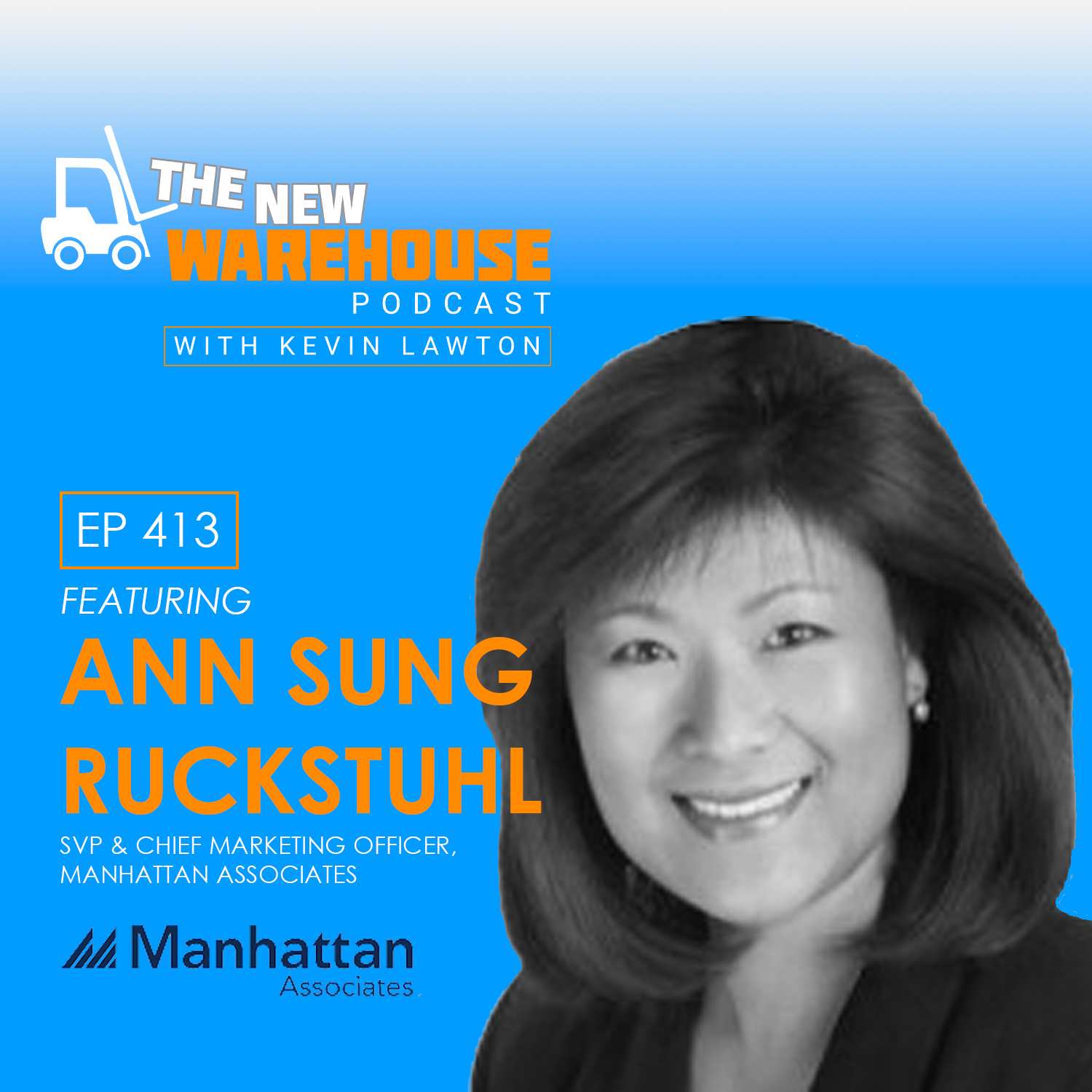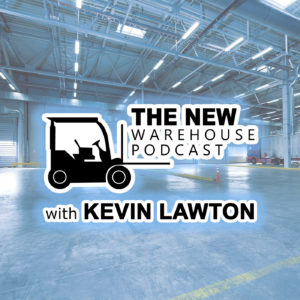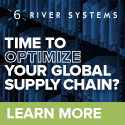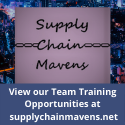
413: Creating a Sustainable Supply Chain: Strategies for a Greener Future
413: Creating a Sustainable Supply Chain: Strategies for a Greener Future

In this episode of The New Warehouse Podcast, Ann Sung Ruckstuhl, Senior Vice President and Chief Marketing Officer of Manhattan Associates, discusses sustainability and efficiency within the warehousing and logistics industry. Manhattan Associates is at the forefront of sustainable supply chain transformation through innovative systems and software solutions for the warehouse and transportation segments.
Sustainability isn’t just a buzzword to Ann; it’s a critical aspect of modern business, intertwining passion and science. As Ann aptly puts it, “Sustainability has a bleeding hearts element, but there’s a science element to it as well. Without the passion and the science, nothing real will happen.” So, let’s embark on a journey to explore how sustainability is becoming an integral part of the warehousing and logistics landscape.
The Urgent Need for a Sustainable Supply Chain
Ann points out that the logistics industry is a significant contributor to global carbon emissions, responsible for 60% of the world’s carbon emissions. This alarming statistic makes it clear that we, in the logistics industry, are both guilty and empowered to drive change. A sustainable supply chain isn’t just a nice-to-have; it’s an urgent need. She emphasizes, “When you want to solve a problem, you look for the variable with the biggest influence. We’re the biggest variable in this whole equation. That’s one of the biggest reasons we must focus on sustainability.”
Furthermore, we live in an era where technology, climate change, and shifting human behavior converge. Technology gives us the tools to gain visibility and control over supply chains. Climate change forces us to confront the urgent need to reduce our carbon footprint. And human behavior is shifting towards more sustainable choices. Ann explains, “We have a unique window of opportunity where technology, climate change, and human behavior change converge. This convergence empowers us to operate supply chains most efficiently, sustainably, and socially responsibly.”
The Consumer-Driven Sustainability
Ann highlights Manhattan’s survey results, revealing that 49% of global consumers prioritize sustainability in their purchase decisions. However, only 27% of retailers consider sustainability a top business priority. This gap between consumer expectations and retailer priorities is an area that needs attention. Ann emphasizes, “Consumers care about sustainability, and brands must catch up. The level of urgency is not matched, but the winners who make money in unified commerce do more on sustainability.”
One way Manhattan Associates is empowering consumers is through improved visibility and control. By partnering with Google, Manhattan ensures consumers can access vital information such as product availability, location, and accurate delivery promises. This enhanced visibility benefits consumers and aligns with the sustainability goals of reducing unnecessary trips and improving overall efficiency.
A Sustainable Supply Chain Yields Profitable Results
Sustainability isn’t just about reducing environmental impact; it also makes good business sense. Manhattan Associates’ recent Unified Commerce Benchmark proves this. Leaders in sustainability practices within the commerce sector are experiencing revenue growth three to six times that of their counterparts.
Ann shares some empirical facts from the benchmark. Leaders are twice as likely to offer sustainable packaging, 87% of them disclose sustainability practices related to product sourcing, and 60% disclose sustainability product-specific information. These actions resonate with consumers increasingly purchasing based on a brand’s sustainability efforts. Ann explains, “Sustainability is a good business. It’s important, measurable, trackable, and optimizable. These practices benefit the environment and boost revenue and profitability.”
Key Takeaways for a Sustainable Supply Chain
- Urgent Need for a Sustainable Supply Chain: The logistics industry significantly contributes to global carbon emissions, making sustainability an urgent need. Converging factors, including technology, climate change, and shifting consumer behavior, provide a unique opportunity for positive change.
- Consumer-Driven Sustainability: Consumers prioritize sustainability, but many retailers lag in making it a top business priority. Enhanced visibility and control, facilitated by Manhattan Associates, empower consumers to make more sustainable choices.
- Profitable Sustainable Practices: Sustainable supply chain practices are environmentally responsible and drive revenue and profitability. Leaders in sustainable supply chain practices experience substantial revenue growth and are more likely to disclose sustainability efforts.
Listen to the episode below and leave your thoughts in the comments.
Guest Information
For more information on Manhattan Associates, click here.
To connect with Ann on LinkedIn, click here.
Check out the podcasts below for more information about creating a sustainable supply chain.
406: Unleashing Sustainability in Warehousing with Delivered
399: Sustainability and Digital Innovation in Warehouses with Dematic
388: Enhancing Safety and Sustainability With Nucor Warehouse Systems





Navigating Fleet Electrification with Kevin Kushman of Electrada
[…] 413: Creating a Sustainable Supply Chain: Strategies for a Greener Future […]
Customer Returns at 3PLs & Warehouses Solved by Two Boxes
[…] Sustainability – Additional packaging and transportation associated with reverse logistics contribute to logistics being responsible for 60% of the world’s carbon emissions. […]
Elevating Craft Beer Logistics through Strategic 3PL Collaboration
[…] long-term viability. The logistics industry faces its own challenges, with experts estimating it contributes up to 60% of global carbon emissions. Each sector has its mountain to climb, and each is making concerted efforts to reduce its […]
Digital Revolution in Logistics | LGI's Technology Stack Leads the Way
[…] Although the logistics industry has significantly improved over the past few decades, there are still tremendous opportunities to enhance efficiency, reduce environmental impact, and drive out waste. Research by the Association for Supply Chain Management (ASCM) identified digital supply chains as a top trend amongst respondents, up five spots from the previous year. The logistics industry is rapidly changing as it embraces integrating AI and automation. Experts estimate the logistics industry is responsible for sixty percent of the world’s carbon emissions. […]
The Future of Freight: Tech Integration for Established Brokers | LGI
[…] change. The logistics industry, a notable contributor to global carbon emissions, responsible for 60% of the world’s carbon emissions, must seek sustainable […]
Sustainable Pallet Innovation by Green Current in Logistics
[…] 413: Creating a Sustainable Supply Chain: Strategies for a Greener Future […]
Impacto ambiental de la logística hiperlocal
[…] sector logístico juega un papel importante en las emisiones globales de carbono 60% del carbono total del mundo. El proceso tradicional de devolución de artículos grandes, como sofás, puede ser oneroso, […]
The Environmental Impacts of Hyper-Native Logistics - Patio Furniture
[…] logistics sector performs a considerable function in international carbon emissions, accounting for 60% of the world’s total carbon output. The standard return course of for big objects like couches could be cumbersome, costly, and […]
The Environmental Impacts of Hyper-Local Logistics – ColorMag Pro News Portal
[…] logistics sector plays a substantial role in global carbon emissions, accounting for 60% of the world’s total carbon output. The traditional return process for large items like couches can be cumbersome, expensive, and […]
De milieueffecten van hyperlokale logistiek - Woon Lifestyle
[…] logistieke sector speelt een substantiële rol in de mondiale CO2-uitstoot 60% van de totale koolstofuitstoot in de wereld. Het traditionele retourproces voor grote artikelen zoals banken kan omslachtig, duur en belastend […]
Best-in-Class Reefer Transport: Key Traits for Excellence
[…] logistics industry accounts for an estimated 60% of global emissions. Best-in-class companies understand this impact and are willing to make meaningful changes to […]
Momentum 2024: Pushing Possible with Manhattan Associates » The New Warehouse
[…] Podcast: 413 Creating Sustainable Supply Chain Strategies for a Greener Future […]